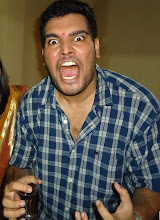If you happen to live in or visit India and are told that religion is harmful or that God is evil, be not surprised. Religion is post-independence India’s most prolific excuse for bloodshed. Communalism has become an everyday ingredient of our political ideology and vast portions of the population view religious sentiments as above the law.
We may have stopped believing in dragons, the Tooth Fairy and unicorns, but the fear of a divine power continues to grip the populace like a disease. Those of us who maintain a contrary position are forced to choose our words with care, for skeptics are easy targets in a largely illiterate nation. It may not be as bad as Europe in the days of the inquisition, but it isn’t any good for a supposed “future superpower” either.
Throw into the scenario morality-deprived, power-hungry, embodiments of cynicism we call politicians, and the problem becomes apparent. Some of the most powerful men in the country are those who have struck a religious chord with the people. Mighty India is putty in the hands of those who have the masses convinced God is on their side. They manipulate the ignorant with such ruthless skill that, did one not know better, one might even be impressed.
These charlatans are deceptively clever; they know a fanatic is worth ten moderates on the battlefield, they create communal tensions with a subtlety and patience that would do the Greek philosophers proud. The fanatic has no fear and no remorse; the fanatic is convinced the universe needs him, that he is a man on a divine mission. And the charlatans use him as a pawn with glee.
The urgency of the problem is hard to overestimate. Rarely has the world’s largest democracy felt the need for secular values as it does now. Globalization has effectively removed borders and placed us all in the same arena. If the world is to take India seriously, the country needs to function not as a collection of cultures, but as one proud nation. Today, India is a land of Hindus, Muslims, Christians, Sikhs and Buddhists. It needs to be a land of Indians. Religion is a personal matter for every individual; it should play no part in identifying a people. One can call himself a Hindu or a Muslim, but it is crucial that he sees himself as an Indian first.
Yet, we see zilch done in the way of improving matters. The religious vote has proved too lucrative for our beloved politicians to not capitalize on it. Our political parties use it to divide us. They incite hatred to advance their personal agendas. From the India-Pakistan partition to Indira Gandhi’s assassination; from the banning of The Satanic Verses to the demolition of the Babri-masjid, religious tensions have shaped modern India; there can be no avoiding that one, brutal fact. Our schools may teach children that “all religions are the same”, it will only make as much difference as an umbrella against a tsunami. We need our leaders to stop exploiting and fostering communalism if there is to be any hope for the future.
Such an eventuality seems remote, if not absurd, for the moment. The longer this is left unchecked, the bleaker our future. This fusion of religion and politics remains the greatest hurdle to our social development. Talks of economic growth and our dominance in the IT industry will amount to nothing but idle boast if our retrograde mentality does not mature with the rest of the world.
One has every right to believe in God and take comfort from his religion. But to what extent can we afford to let religion influence our laws? How can God shape our political class when many of us disagree on who the real God is? What happened to those secular values the founding fathers of modern India cherished?
As we say in India, “Only God knows.”
Subscribe to:
Post Comments (Atom)

No comments:
Post a Comment